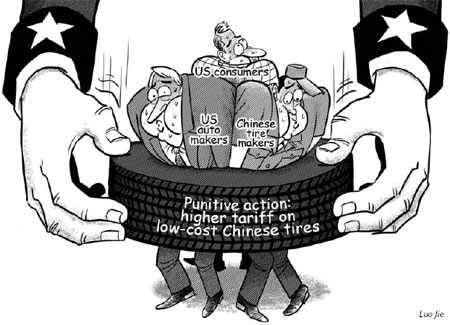In an economically interdependent world, protectionism may not serve a country's own interests. Instead, it may backfire on that nation, particularly during a global financial crisis.

The recent China-US tire trade dispute could become such an example.
The case obviously reflects tints of protectionism, as the US International Trade Commission proposed punitive duties on Chinese tires after the US Steelworkers Union, which represents workers at major domestic tire manufacturers, filed a petition complaining of job losses due to imports from China.
The commission has recommended a 55 percent tariff on Chinese tires that would be reduced to 45 percent in the second year and 35 percent in the third before being removed.
The protectionist proposal seems not to serve US economic interests and will also punish consumers, the job market, and the auto industry, distributors and experts said during a hearing on Friday conducted by the US Trade Representative's office.
"There are no allegations of unfair trade practices, nor are there allegations that anyone has violated US trade law," Vic DeIorio, executive vice president of GITI Tire, a Singapore-based company that is the largest tire manufacturer in China, said in a statement.
Thomas Prusa, an economics professor at Rutgers University, testified during the hearing that the domestic job market would be negatively affected if a high tariff was imposed on Chinese tires.
Prusa said that for every job saved or created at an American tire factory, a dozen to 25 jobs could be lost in the distribution sector due to the elimination of the import business and a decline in sales and tire installation jobs.
The professor estimated that Americans would have to pay an extra 600 million to 700 million US dollars each year for more expensive US-made tires.
Charles Uthus, vice president of the Automotive Trade Policy Council, said US automakers "will have no choice but to absorb the additional cost if higher duties are imposed."
Prusa believed that the commission's proposal narrowly focused on job losses in the US tire industry but lacked consideration of an overall impact on the US economy.
In fact, Chinese and US products are complementary in the American tire market.
Jim Mayfield, president of Del-Nat Tire Corp., testified that for the past 15 years, major US producers have focused on higher-profit and better-performing tires instead of the lower-end market that Chinese products target.
"They tell me 'we got out of that business and we are not going back,'" Mayfield said.
A USTR policy recommendation concerning the case will be submitted to the White House for a final decision.
It was expected that the US government would listen to the Chinese and US manufacturers, and consumers and issue a ruling that would cater to the interests of both countries for a win-win result.
At a time the world economy is seeing positive signs in some areas but still faces lingering uncertainties, protectionism is widely viewed as the biggest hurdle to recovery.
Analysts have noted that at this critical moment for world economic recovery, the US will send the wrong signal if it comes up with a protectionist ruling on the tire trade case.
(Xinhua News Agency August 10, 2009)